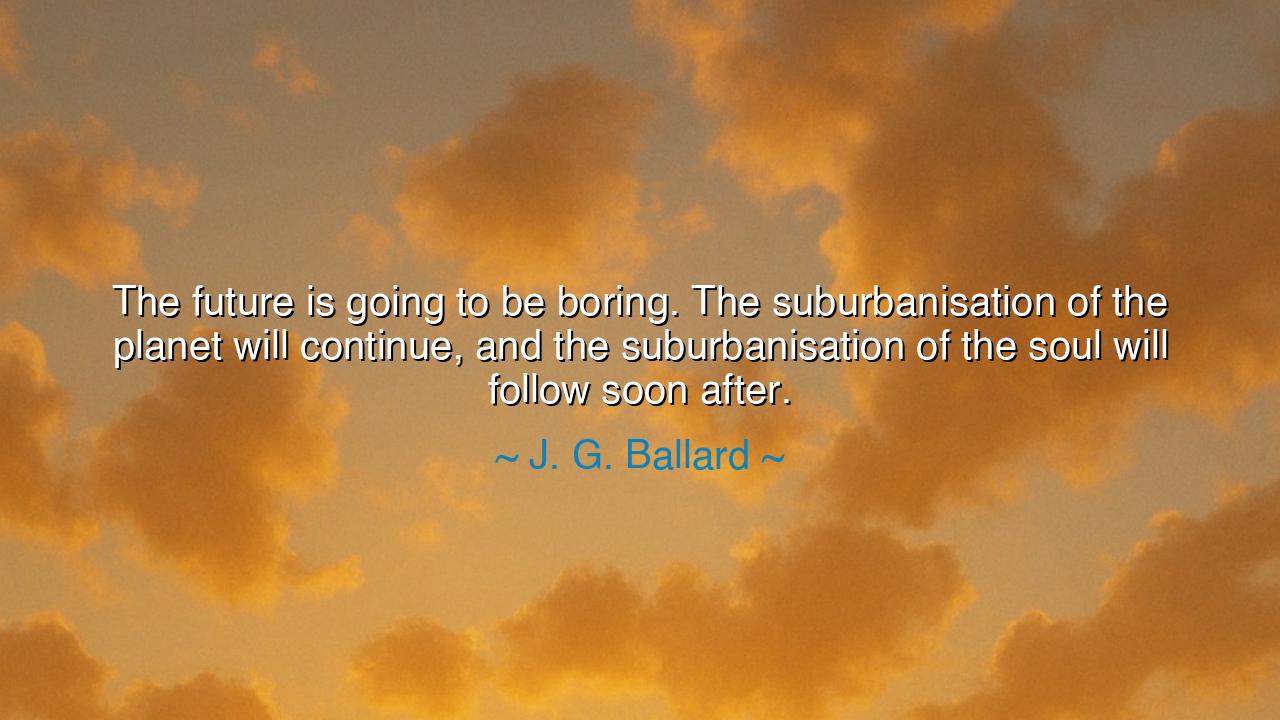
The future is going to be boring. The suburbanisation of the
The future is going to be boring. The suburbanisation of the planet will continue, and the suburbanisation of the soul will follow soon after.






In the sweeping currents of time, there are moments when the direction of society becomes clear—when the forces of progress seem inexorable, and the future appears inevitable. Yet, in these times, there also arises the disquiet of those who foresee the mundane and uninspired path ahead. J.G. Ballard, in his somber reflection, "The future is going to be boring. The suburbanisation of the planet will continue, and the suburbanisation of the soul will follow soon after," warns us that as the world becomes increasingly homogenized and standardized, the soul of humanity itself may become stripped of its vibrancy and individuality. His words speak not only of physical spaces but of the very nature of our lives—predictable, routine, and, ultimately, uninspiring.
The ancients were keenly aware of the tension between progress and authenticity. Homer, in his Iliad and Odyssey, portrays heroes who fight for more than territory—they fight for freedom, for the spirit of their people, and for the preservation of their identity. Achilles and Odysseus are not merely warriors in physical battles, but champions of a larger struggle to keep alive the essence of life in a world that often seeks to dull it. In Ballard’s vision, the future may see the erosion of this heroic individuality, replaced by a world of uniformity, where the desire for personal expression is stifled by the forces of convenience, repetition, and conformity.
Consider the rise of the Roman Empire, a civilization that at its height was both magnificent and monotonous. Rome built vast cities, filled with monumental architecture, gladiatorial games, and entertainment, all serving to distract its citizens from the passions and deeper questions of existence. Yet, as the empire expanded, it also became more standardized, more predictable—its vast infrastructure, designed to unify, ironically began to homogenize the very culture it sought to unite. In a similar vein, Ballard’s words suggest that the future, with its suburbs, shopping malls, and endless rows of identical homes, will increasingly become a metaphor for a soul-less existence, devoid of the creative chaos that once defined the human spirit.
The Renaissance, however, offers a powerful contrast to this vision of the future. It was a time when creativity and individuality flourished, giving rise to some of the greatest minds in history: Leonardo da Vinci, Michelangelo, and Raphael—figures who celebrated difference, innovation, and the beauty of a life that sought meaning beyond the mundane. They lived in an era where art, science, and philosophy were seen as intertwined pursuits of truth, and where the individual was allowed to stand apart from the crowd. In this way, the Renaissance was a profound rejection of the monotony that Ballard feared. It was a time that honored the diversity of human experience, encouraging the flourishing of the soul.
But even as the Renaissance reached its height, the seeds of uniformity were being sown. The rise of industrialization and the modern world led to the spread of urbanization, with its standardized buildings and commodified lifestyles. The suburbs, as Ballard points out, became symbols of this growing trend—places designed for convenience and homogeneity rather than for the expression of human uniqueness. It was here that the suburbanization of the soul began to take root, as people increasingly sought comfort and security, leaving behind the uncertainty and adventure that once defined the human experience. Ballard’s warning is that, in our quest for comfort and predictability, we may lose the very spirit that makes life worth living.
The lesson of Ballard’s quote is clear: in our pursuit of a secure and comfortable future, we must be vigilant not to trade away the richness of life. Innovation, creativity, and individuality are the lifeblood of a truly meaningful existence. We must be careful not to allow the world to become so homogenized that it drains the very essence of what it means to be human. Just as the ancients warned of the dangers of complacency and stagnation, so must we recognize that the future is not merely about convenience, but about the preservation of the soul—the freedom to live with passion, purpose, and authenticity.
To follow this path, we must actively choose to embrace the chaos of creativity, to live not by the rules set by others, but by the deeper callings of our own spirit. Whether in our work, our art, or our relationships, we must seek to cultivate lives that are filled with meaning and depth, rather than the dullness of conformity. Let us take heed of Ballard’s warning and reject the impulse to retreat into the comfortable, predictable patterns of life. Instead, let us be brave enough to live authentically, to embrace the uncertainties and complexities that give life its vibrancy, and to honor the individuality that is the essence of the human spirit.






AAdministratorAdministrator
Welcome, honored guests. Please leave a comment, we will respond soon